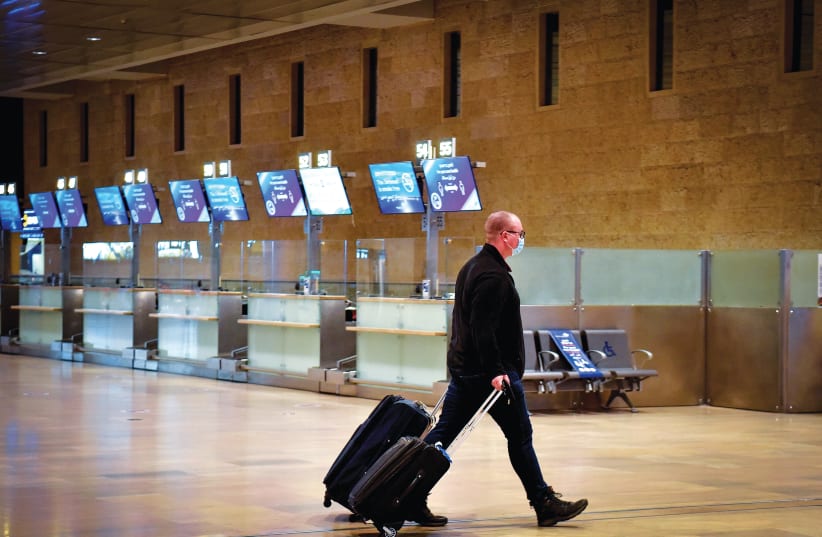"What worked in terms of Israel-Jewish Diaspora relations doesn’t work anymore. Instead of viewing the Diaspora as a wallet, the new objective is keeping Jews Jewish and connected to Israel even if they don’t make aliyah.”
Sounds nice.
That was Naftali Bennett’s mission statement in 2014, when he served as minister of Economy and Diaspora Affairs. It was an idea Bennett pushed a lot back then, and I know, as I was serving at the time as a senior adviser on his staff. It fit into a larger initiative that the government was trying to promote in its pursuit of ways to bolster Israeli-Diaspora ties.
In some ways, Bennett was a bit extreme in his approach. Israel, he argued then, should consider offering Jews of the world “semi-citizenship,” a status that would be less than full citizenship but would give the Diaspora “some sort of say,” as he put it, in government decisions.
It was not really surprising coming from Bennett. Born to American olim, he spent several years in his youth in the US and Canada, and later lived in New York running a hi-tech company. Bennett knows and appreciates the Diaspora, especially how it changed his life when his wife became religiously observant there. He came into politics understanding the importance of the Diaspora’s relationship with Israel, as well as Israel’s symbolism, and how it was more than just a state for those who live within its borders.
That is why it was disappointing this week to hear Bennett say that while the Diaspora is “close to my heart,” he would not be changing corona regulations to allow the Jews of the world to enter the State of Israel. Diaspora Jews are foreigners who have been banned from entering Israel since the end of November, and so they shall remain, he said.
Bennett’s position might seem understandable. He is the prime minister of Israel, and his responsibility is first and foremost to safeguard the security of the citizens of the country whose government he currently heads. While most Israelis certainly feel an affinity to Jews from around the world, they don’t think having them enter Israel during a global pandemic needs to be a national priority. The pandemic is raging, this argument goes, and foreigners – even Jews – should stay in their countries and we will stay in ours.
They are wrong.
The problem with this thinking is that it looks at Israel through the narrow prism of being a country just for the people who live within its borders. It disregards the significance and symbolism it holds for other Jews from all corners of the globe.
Keeping Jews out for over a month now undermines the way Jews – especially those who do not live here – look at Israel: as a sanctuary, a safe harbor, a place for inspiration, and national connection.
And that is what the issue really boils down to: is Israel just like any other country, or is it something more? Is it a place where only the citizens who live there can call home, or does the role it plays in Jewish life give it a different standing?
The continued closure of Israel to Jews around the world is wrong, since it ignores and dismisses the critical role Israel plays in the lives of many of these foreign Jews. It is a place at the center of their very identity, one they pray for, care about, and support in more ways than one.
Does that mean these Jews have ownership over Israel? Of course not. Does it mean that they have a stake in the country’s future? Absolutely.
Until corona, the feeling was that the Israeli government understood this. The annual investment of hundreds of millions of shekels in programming for Diaspora Jews, through Birthright, Masa, Mosaic or Momentum, was an illustration of Israel’s recognition of the duality of this relationship.
Israeli taxpayer money goes to Jews around the world because we understand that their fortitude, safety and Jewish identity are important not just for them, but also for us.
It is Israel’s way of showing that having engaged, educated and proud Jews in New York, Sao Paulo, Johannesburg, Paris and Sydney is important for the state and its people.
But this is not enough – the government needs to begin to listen to the way some Jews in the Diaspora these days talk about Israel. Community leaders, philanthropists, rabbis and just ordinary Jews who used to visit frequently are now being told they are not wanted; observant South African Jews are turned away at the airport and forced to desecrate Shabbat and board flights out of the country; and educational programs for which Israel was at the core are hanging by a thread.
The government is actively taking some of Israel’s greatest friends and supporters and turning them against the state.
Take Birthright as an example. Before the pandemic, it was bringing 50,000 participants a year to Israel. This past year, it barely got to 6,000. Combine that with 2020, and we have approximately 100,000 young Jews who missed an opportunity to connect with Israel, Judaism and their heritage.
The result? Check intermarriage rates among those who participated in the free 10-day trip and those who didn’t: out of the 100,000 who did not come to Israel, 61% – according to past studies – will marry a non-Jewish partner. Had they come, the number would have dropped to 45% (True, intermarriage is not the only way to look at this, and it is even a bit anachronistic since many of Birthright’s own participants come from intermarried families, but it is still an important metric).
By not being allowed to visit here, these potential Birthright participants are missing out on creating a lasting connection with the state and its people. A visit creates those bonds. Only a visit can.
AND THAT IS the question Israelis need to ask themselves: does their state play a broader and deeper role for the Jewish people, or is it just a home for its citizens?
Consecutive governments in Israel have grappled with that question on matters of religion and state: does the country accommodate requests by progressive Jewish movements to have a place to pray at the Kotel? Does it open up conversion to non-Orthodox? Does it allow Reform and Conservative to marry here?
These questions come up since they are important to worldwide Jews, and Israel understands that as the “Jewish State,” it cannot close itself off to them, no matter how hard haredi politicians try to strangle any form of Judaism that does not meet their strict traditional standards.
President Isaac Herzog articulated the issue well on Wednesday when he said that the ban on foreigners was the first time in Israeli history that the country was not letting Jews into its borders. It was, he said, a fact that Israelis could not just ignore.
What is the solution? There are a number of ideas being floated. The government could decide, for example, that someone who has family here can visit, and of course under vaccination and quarantine restrictions.
It could also decide – as Bennett himself suggested in 2014 – to create a semi-citizenship for Jews around the world, and allow those people to enter the country.
What would that semi-citizenship be based on? For that, there is already an Israeli law: the Law of Return. The government could decide, for example, that anyone who is eligible to immigrate under the Law of Return would be eligible to receive that “semi-citizenship.”
Are these perfect solutions? There are none. Some will push back on semi-citizenship itself, while others will argue that allowing just Jews into the country discriminates against Christian-Zionist groups, who are no less dedicated to the state.
What we need to realize is that these bans come with a price – a price that Israel’s government should refuse to come to terms with. After a month of the country shut down to foreign Jews, it is time to reopen.
Remember, prime minister: Diaspora Jews are not just a wallet.

